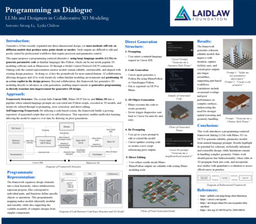Last week the trainings and discussions we had cut across the disciplines. How does the interdisciplinary nature of this program, the fact that students are focusing on such a diverse range of projects, help you think about your project and/or your academic interests more broadly?
Laidlaw is a unique fellowship in the sense that it brings together people from both stem and humanities disciplines. This relates really well to my academic interests as I am focusing on AI which is a field that is inherently built as a crossover between the humanities and Stem. Especially now with the rise of LLMs, AI performance depends more and more on their ability to interact with people on an emotional level rather than their ability to solve logical problems.
Much of the cutting-edge research today draws heavily from traditionally humanities-based disciplines such as linguistics, translation theory, and semantics. It’s made me realize that while AI is built on STEM foundations, its real-world applications often lie in the humanities. This is why I think programs like Laidlaw, which encourage this kind of interdisciplinary collaboration, are essential for moving the field forward.
As you begin your individual research projects this week, do you anticipate any challenges in getting started? If so, what are they?
The programming challenge is proving to be bigger than anticipated. As a lot of the research I am doing is built on top of relatively new tech so there aren’t a lot of pre-existing workflows that I can follow. Another challenge is the amount of new concepts I have to learn to implement a program that runs on a lot of the newly released models and databases (as these tend not to be covered in current computer science classes). So a lot of this week has been spent trying to just figure out what all of these new buzz words mean (vector databases, mcp, agentic workflows, dynamic injection …), but I hope that my programming speed will increase in the coming weeks.


Please sign in
If you are a registered user on Laidlaw Scholars Network, please sign in